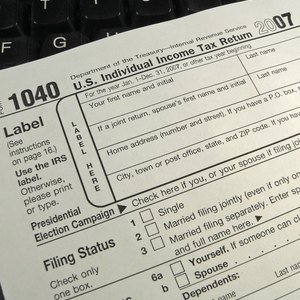
If you’re an election worker, you may be a little confused on how to go about reporting your poll worker paycheck on your tax return. You also have to take into consideration how, or if, you are responsible for Social Security or Medicare taxes. While this type of income reporting may seem daunting on the surface, in reality, it’s not much different than filing a tax return for any other source of income. And, the IRS has numerous resources and instructions to help you along the way.
Tips
If you have earned more than $600 working as a poll worker during an election, you will have to report this income on your current IRS Form 1040 when you file your taxes.
Are Election Workers Employees?
Hired by government entities to perform duties at polling places during national, state and local elections, election workers are ballot clerks, voting officials, poll workers, absentee ballot counters, polling place managers and machine tenders, among other titles. Because election workers are not considered independent contractors, but rather employees, federal income taxes must be withheld from election worker pay. This income also may be treated as wages as pertaining to Social Security and Medicare, or FICA contributions, which are mandatory payroll deductions – even if you only receive a one-time paycheck – that are withheld from income to contribute to Social Security and Medicare.
It doesn't matter if you are paid a stipend or a set fee per day for the period you worked the election. You will have to report the election income if you meet the minimum income thresholds to file a return for the year. When you began your election employment, you likely filled out an IRS Form W-4, Employee's Withholding Allowance Certificate. This form lets your employer know how much in federal income taxes to withhold from your paycheck.
How Do I Report My Poll Worker Income?
Any compensation you receive as a poll worker is to be reported as taxable on your IRS Form 1040, U.S. Individual Income Tax Return, even if you do not receive an IRS Form W-2, Wage and Tax Statement, for this work. However, if you earned more than $600 in wages for your election work, election workers should get a W-2. If your employer fails to do so for some reason, it is still your responsibility to include this income when you file your taxes. To help you determine if you need to file taxes for any given year, the IRS has an Interactive Tax Assistant, or ITA, at your disposal. In order to complete the interview, you need your correct filing status, information to figure your gross income and the amount of federal income tax you had withheld. Upon completing the ITA, and if it is determined you are required to file, then use the Instructions for IRS Form 1040 to complete your return.
Social Security and Medicare Considerations
According to the Social Security Administration, in 2017 and 2018, election workers must earn more than $1,800 in a calendar year before they are required to pay FICA taxes, unless your election wages are subject to Social Security and Medicare taxation by your state under Section 218 of the Social Security Act. Many state and local government employees are excluded from FICA taxes until their election wages reach the $1,800 threshold, at which point the income is subject to FICA tax.
It is best to contact your state Social Security Administrator with questions regarding Section 218 coverage, as Social Security coverage varies greatly from state, and even within local jurisdictions. You want to make sure you are in compliance and having the appropriate taxes withheld. Sometimes employers neglect to properly file Section 218 coverage for their employees, resulting in incorrect filings that often aren’t caught until the IRS or Social Security Administration catches the error during an audit.
References
- IRS: Election Workers: Reporting and Withholding
- IRS Video Portal: Payroll Reporting for Election Workers
- Social Security Administration: Election Officials and Election Workers
- IRS: Do I Need to File a Tax Return?
- IRS: Section 218 Agreements and Social Security Coverage
- Social Security Administration: Employment Coverage Thresholds
Writer Bio
Tara Thomas is a Los Angeles-based writer and avid world traveler. Her articles appear in various online publications, including Sapling, PocketSense, Zacks, Livestrong, Modern Mom and SF Gate. Thomas has a Bachelor of Science in marine biology from California State University, Long Beach and spent 10 years as a mortgage consultant.
